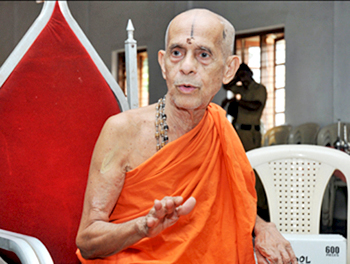Udupi, Jun 30: Sri Vishwesha Teertha Swamiji, the chief pontiff of Paryaya Pejawar Mutt has brushed aside the demand of fringe groups like Sri Ram Sena that he should apologize for revealing the fact that many Hindus also consume beef in India.
Several Hindutva hardliners including SRS chief Pramod Muthalik had slammed the senior pontiff and asked him to withdraw his statement which exposed the double standard of communal outfits that use beef as a pretext to target Muslims.
Replying to queries of media persons here on Thursday, the seer once again justified his decision to host iftar party for Muslims and allow them to offer namaz at the dining complex of the Krishna Mutt.
He also recalled an instance wherein leaders of Hindu community had reportedly reached an agreement with their Muslim counterparts to allow Muslims to offer namaz once in a week in the proposed Ram temple in Ayodhya when VP Singh was the prime minister of India.
The seer re-iterated that allowing Muslims to offer namaz cannot be an insult to Hindus or Hindu religion. Instead, it creates a positive opinion about Hindus among the followers of other faiths, he said.




Comments
Good for her. She has an amazing voice.
@Ahmd It would be nice if you keep your God stuff for yourself.
He is rowdy sheeter... no need of publicity....
Add new comment